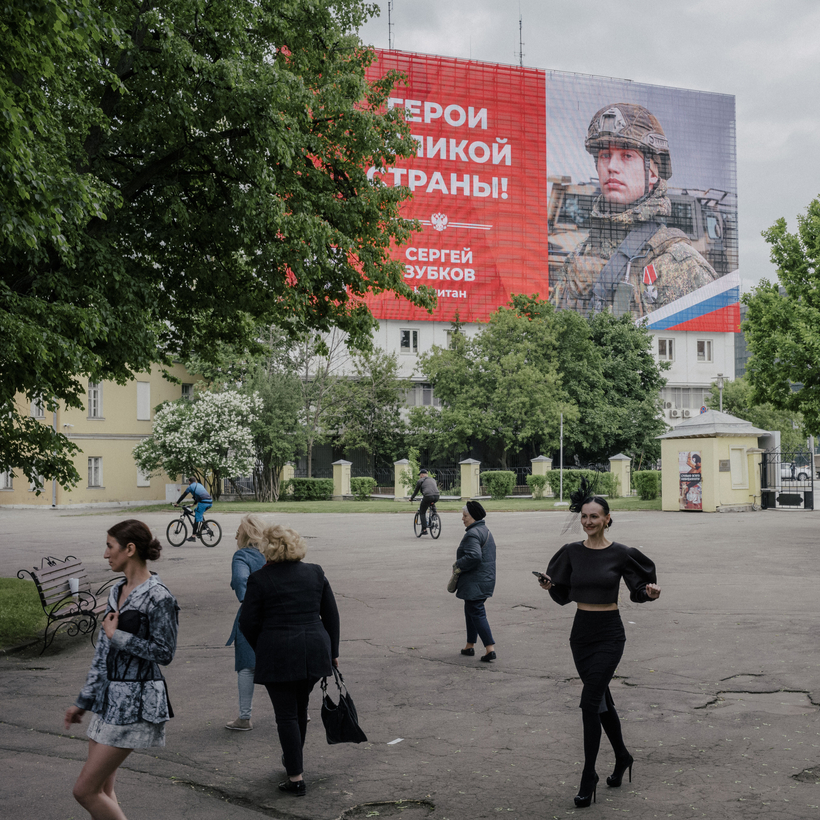In today’s Moscow, everything feels carved in stone, never-ending, never going to change—most days it seems that our current authorities are going to hold power forever, the war is anything but close to an end, and what we live in is just a Polaroid snapshot, slowly fading as things very gradually become worse.
In small bites, the government keeps passing new repressive laws that harm the most vulnerable. They banned medical transition for trans people, restricted access to oral contraception for women, and curbed the rights of those with mental disorders. Men are suffering an extra blow as the Kremlin keeps shutting down ways to avoid the draft, even for those least suited to combat—for example, men who have been notified of their eligibility can no longer leave the country. The official rhetoric is that it is not the Ukrainian people that “we” are attacking but “the West,” with its “liberal values,” and if fighting such a huge and ghostlike enemy seems doomed, it is also noble.

Lack of military success must have made our authorities quite desperate to recruit as many soldiers as possible and abolish so many human rights, which they equate with “Western propaganda.”
Pro-war propaganda, Z letters, and numerous flags, which in the first days of the war rose up everywhere, have disappeared from the streets. The city would look completely livable, peaceful, busy, and normal if not for recruitment posters pasted on the door of every establishment (but you get used to ignoring them), and the Ukrainian drone attacks in Moscow, which are harder to ignore. Sometimes I wake up from what sounds like the start of a fireworks show, only to realize that something in the city has exploded. Property is damaged, but so far no lives lost, which is a relief. Thinking about how my friend Nina, in Dnipro, Ukraine, has watched whole residential buildings collapse in her neighborhood, I feel I have no right to worry.
But there is nothing normal about people’s fear of a sudden turn, of a final creak of the system collapsing, which, as we now have learned, could happen at any moment.

On the evening of the aborted Prigozhin coup, June 23, I was buying coffee at my favorite café when a text from my partner—“This might be the start of a civil war”—introduced me to the news. Yevgeny Prigozhin, the former leader of the Wagner private military company, was gathering his troops in the south of Russia with the goal of actually seizing power in the country. It was not clear what he was planning to do in the event of success—but expecting anything other than a full-scale military dictatorship from this coup d’état was too much wishful thinking.
Lack of military success must have made our authorities quite desperate to recruit as many soldiers as possible and abolish so many human rights, which they equate with “Western propaganda.”
And yet, for a moment, the Internet was full of videos from Rostov, where Wagner troops had taken control: people laughing, dancing in the streets as if some long-awaited liberty was coming to them. However dreadful our perspectives were, some seemed to feel a little more alive then, as at least something at last was happening.
When by about nine o’clock in the evening the coup abruptly ended, the chaotic revel turned into distilled quietness at once. The next day everything came back to being the usual way—except everybody went abnormally silent for a while.
What’s interesting is that this threat of a momentary failure of our state temporarily united people who had not been on speaking terms since the beginning of the war. Family members who trust propaganda, conformist neighbors—they were frightened, too, and some of them reached for close ones with opposing views. Never since the beginning of the war had I had such an intimate talk with my initially pro-government mother and grandmother until that day, when they were truly worried for me, as I was at the moment in the center of Moscow—a place Wagner troops seemed poised to reach.
A timid dialogue began to slowly emerge, revealing that at times the psychological border between us can become porous. Not everybody, obviously, but a few of those who had managed to somehow excuse the invasion of Ukraine before have ceased to do so after months and months of human losses. Seeing how fragile the stability “we” were supposedly fighting for was, those so-called patriots are no longer as eager to stand up for their cause.

As for those opposing the war but still living here, we, too, were not inspired by the idea of a military coup and thus found a little common ground with our opponents. And, unsurprisingly, living together and facing the same dangers and emotional bursts does wonders for human connection. Of course there still are bloodthirsty supporters of the invasion; of course there are plenty of people who work for the regime and knowingly take part in its doings. But no more do I feel like a lost stranger when walking the streets that buzz with patriotic slogans and menacing ads.
What’s interesting is that this threat of a momentary failure of our state temporarily united people who had not been on speaking terms since the beginning of the war.
So, we are experiencing a life of dialectics, both fearing and secretly enjoying chaotic things happening, both suffocated by stagnation and shaken by arrests of people we know and by drone explosions in areas we live in.
There was a day when I woke up to a call announcing that my friend, a poet, had been detained on a bogus charge and beaten up by the police for “looking too queer.” Luckily, in this instance, the lawyer we found was able to save my friend, but before that, our other pals and I waited outside the barbed wire for hours, forlornly holding the food and warm clothes that we hoped, but were not allowed, to drop off for him.

There was another day when another friend, a very bright philosophy teacher, was publicly outed and bullied for being trans on somebody’s anonymous denunciation, and we still can only pray that she doesn’t lose her job. There are days and days when I worry that my partner, who is currently enrolling in graduate school, will be drafted before all the admission documents are ready.
However, devoid of almost any effective means of making a change (we still face huge penalties for doing or saying anything anti-war—and for many other ideologically hazardous acts), we have the power of speaking to each other, and more and more of that will come with every passing day in this rickety construction we call home.
What is important is the drive people around me share, still materially and emotionally supporting those suffering from our regime the most, even despite the difficulty of helping now that it is not just political opposition groups but NGOs and aid groups that have been declared “foreign agents.” There is not much of a global hope for all of us—but there still are little hopes for some lives saved, some love expressed, some human connection cherished.
Katya V. is a poet, a feminist, and a tutor of Russian and English

